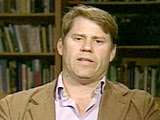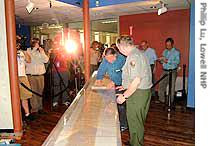 "WOMEN"S CHORUS III
"WOMEN"S CHORUS III
The women finished their shopping, took the beer home and returned to their bench. Mrs. Olson, who had had a stroke 2 years ago when her husband died, came out and as she hobbled by the women laughed. She leaned forward slightly as she walked and dragged her right foot. She was unable to lower her right arm and it was bent at the elbow and stretched across her chest, her hand partially closed and jerking up and down. The women loved to watch her, wondering if she picked up chewing gum and dog shit with her right foot. She oughtta wear steel toe shoes. She probably got that way from jerking her husband off. Laughter. Maybe thats what killedim..." H.S. Jr., 1965.
There are dozens of reasons why I buy books, and the only valid reason not to buy them is lack of shelving space. Perhaps 80% of what I have collected is non-fiction but I must have at least 2000 novels stacked about the place. With enough books on hand to barricade my doorway against the assault of any loony serial fictioneer (Stephen King?, J.K. Rowling?) one might think I spend all my time with my snout in a paperback. But only two things seem to compel me to read novels and I attribute both to the effects of a boyhood raised in poverty.
I learned when still very young not to waste resources, and that included time and book paper. When my attention is drawn to a particularly fat novel, one which does not have Melville or Tolstoy or Dickens embossed on the spine, I am apt to flinch, much like those pretty schoolgirls who fail to disguise their horror a fat nerds in the corridor. I can get a chuckle out of the fact that though I failed to get through MOBY DICK (twice) I did read all of Volume 1 of Hershel Parker's exhaustive biography of Herman Melville, a scholarly tome as lengthy as Ishmael's own tale.
Like most readers (I assume) I am drawn to very specific elements of the story and believe I will enjoy the taste and fibre of its language. (When the sentences get caught between our teeth and we're forced to re-read passages in order to dislodge the pith of the unfamiliar with our tongue, that's high fibre!) A novel need not be built of two pounds of paper to convey an eternal message.
Often my choice of story is based on knowing some detail of the novelist's biography, and I get to satisfy an earlier craving, by returning to fiction I bought when I wasn't even in the mood to read. To illustrate I would point to the so-called "Spy novel". I do like reading good espionage fiction - (in fact I started in Junior High by reading the entire Ian Fleming "James Bond" series) but I seek out authors who have first hand experience with the tradecraft, and not those who merely possess creative imaginations.
The second reason I read novels is a tad harder to admit. I am of occaision, prone to falling into a particular funk when the day in front of me looks like a fraud. Alternatively I may rise to a state of needy agitation, which is actually the bottled up energy of suppressed aggression. Like a junky needing his fix, I'm always conscious of the onset of these needy moods and long experience has taught me they must be assuaged by full immersion in some clever fiction - I guess most call it "escape". I simply describe it as my "need for a fast read". My stash of novels matches the more predictable of my moods, but I still thrill to chance finds. Perhaps that's why I ignore booksellers which over-categorize or even alphabetise (shudder) their stock.
This week I bumped into a trio of novels in a thrift store that begged for my attention. They were paper editions, spanning 1965-1971 and in crisp condition. "Oh Ho!" I thought. "Someone loved you and kept you safe all these years." (Later confirmed by an artifact of ownership - an original, yellowed, 1966 cash register receipt.) I had never heard of THE ROOM, but in five minutes of page turning I realized it was mood-specific. Lovely Kafkaesque descriptions of confinement and interrogation written in a quirky style which indicated genuine distress. (I'll save that one for the Christmas holidays.) On the same plank was a copy of LAST EXIT TO BROOKLYN - by Hubert Selby Jr. and the the third gem was a copy of NAKED LUNCH. Now I already had a Grove first edition of Burroughs' novel, but the p.b offered extracts recovered from testimony at the famous Boston obscenity trial. (I'm a completest - always a valid reason to buy.)
 There is a wonderful story behind the glowing NEWSWEEK review. The TIME magazine review (Oct. 30, 1964) had dismissed the novel. "This is Grove Press’ extra-special dirty book for fall." A constant and opportunistic rival, NEWSWEEK magazine gave Selby an interview as well as the good review. In fact the book is sexually graphic but most of the characters Selby created use sex as a weapon or in their attempts at gallows humor. Portions of the book may have excited me in my virgin teenage years, but today I find not a single "turn-on" in the entire novel. It wouldn't even qualify as S&M fiction.
There is a wonderful story behind the glowing NEWSWEEK review. The TIME magazine review (Oct. 30, 1964) had dismissed the novel. "This is Grove Press’ extra-special dirty book for fall." A constant and opportunistic rival, NEWSWEEK magazine gave Selby an interview as well as the good review. In fact the book is sexually graphic but most of the characters Selby created use sex as a weapon or in their attempts at gallows humor. Portions of the book may have excited me in my virgin teenage years, but today I find not a single "turn-on" in the entire novel. It wouldn't even qualify as S&M fiction.Within an hour of arriving home I realized THE ROOM had been my excuse to buy, but I was LAST EXIT TO BROOKLYN which had me intensely curious. I finished it in two sittings and it was an memorable experience. I sat on my back deck under a flawless blue sky, reading of some of the most hellish encounters an unarmed city dweller might encounter - tales of horrific gang rapes, brutal stomping of off-duty soldiers and sailors, the harrowing physical abuse of dependant wives and the ugly neglect of trusting children.
My wife, a tender hearted mother who is innocent of urban domestic terror, sat opposite me reading her own novel, oblivious to the inevitable flashbacks triggered by Selby's scalding prose. I guess my face didn't register what Selby was putting me through. His astonishing characters and their coping strategies stirred up long dormant memory - the abuses of a man who is dead to me now - whippings with his heavy belt, kicks to my shins with army boots, smacks to the face with heavy spoons, punching a mother in front of four frightened witnesses. (I well recall the blood streaming from her nose and the salty epithets of my anguished Grandmother, helpless and rooted to the head of the stairs... just as I remember the chop to the throat he received from a tough Saint John cop. They tossed him into their car. I was five years old, and confused. Still needing I cried, "They took my father."
It was certainly the "fast read" I sought, searing and very ugly, and yet so unpredictable and exhilarating. An honest witness never trivializes authentic experience and Selby offers us no happy outcomes. Many of the characters who populate his lightly fictionalized Brooklyn simply ride out their misfortunes. The term "closure" had yet to be coined, methinks. Equally tough, we got though our long trial of poverty in Saint John. We were never defeated, and we never forget. True I haven't gone back in 25 years, but I know that the old neighborhood has been revamped. The current residents would not recognize any of the ghosts I know intimately.
I should have netted a copy of this novel long ago, because the word "Brooklyn" has long been a personal literary fetish. Since Junior High School I have picked up any unfamiliar book with the word "Brooklyn" in its title, to examine its contents. Selby's novel was famous enough but I had never spotted a loose copy till now.
+++++++++++++++++++++++++++
On further reflection:
It amazes me that I have never gotten closer to New York than a backseat trip south to visit relatives in Boston. That was years ago and nostalgia does not explain my Brooklyn fetish. Old reading habits do... In the late 1960s, AFTER the divorce, we were a returned family living on Welfare in the old port city of Saint John, New Brunswick. My mother was a North End Catholic girl who bore me out of wedlock. (It was more common an experience than her generation will admit.) Suffice it here to note she was exiled far upriver to Grand Falls to hide her disgrace, and where she double-crossed the doctor who had brokered my adoption. In her youthful desperation she married a guy from Ontario who gave her three more. He beat her and whored around, but my mother proved indomitable and plotted to take what she loved and that was hers. She took us home with her to start over. Our first flat in S.J. was in a decrepit, century old tenement on Main Street (it leaned drunkenly, six feet off centre) until we could get into a public housing project in a neighborhood called the Rifle Range - a tract of postwar veteran's housing given a second life as refuge for society's walking wounded.
 The North End of Saint John in the 1960s was working class and decaying. My mother's family, Joyce and Brown, arrived on the immigrant boats from Sligo, Ireland circa the 1830-40, and then stayed put. I left in 1981.
The North End of Saint John in the 1960s was working class and decaying. My mother's family, Joyce and Brown, arrived on the immigrant boats from Sligo, Ireland circa the 1830-40, and then stayed put. I left in 1981.Life was raw for several years. A freezing apartment, toast and molasses breakfasts, a busted up B&W television, handed down clothes, bitter arguments and fights over childish nonsense, Christmas dinners supplied by the Empty Stocking Fund, a few cheap toys bought with a Welfare voucher... and the constant fear of being beaten up by the 3 or 4 families of tough Black kids who owned our street. One winter's day a Black tripped my little sister, knocking her front teeth out. The following summer I watched his obese sister running down the middle of the street flailing a twelve inch butcher knife. The behemoth was tackled by four brave paramedics who sedated her. The frequent combats beneath our windows drew massive crowds, but only one incident proved fatal. (Years later when I took a Criminology course with a Saint John policeman he told me that on the job our street - Churchill Boulevard- was known to cops as the "Boola-Boola-vard".)
We kids lived in front of the TV but I also became a maniac for books. A fond memory is the busy display rack at the entrance to the Free Public Library, which invited patrons to exchange their unwanted paperbacks. Though I had nothing to offer in trade, I swear I read every book I took home. I then had no direct exposure to American media (we had one TV station - a CBC affiliate) and certainly no concept of contemporary American literature. I needed more guidance than was available to me, and at the very least Hubert Selby Jr would have helped me appreciate the fact that urban decay and soul crushing poverty were not Canadian inventions. Sad that I never found his work.
Instead, one day in the early 1970s I discovered Betty Smith's novel, A TREE GROWS IN BROOKLYN and therein the first fictional family I could identify with. It's a rather tame novel by today's standards but I delighted in the resilient characters and family trials which seemed familiar. It struck a cord with a fourteen year old Canadian who had forfeited much of his boyhood to assume partial responsibility for three siblings. It's safe to assume that I idolized the resilient mother character, comparing Mrs. Nolan's survival strategies to those of our own experience. My mother kept returning to work as a cashier, calling home frequently, but when the neighborhood threatened to consume her youngest sons she chose to be waiting at home. It wwere threats and tears aplenty, but she saved them. I found a soul mate in Francie Nolan, the Brooklyn girl who used her reading life to chase away the spectre of poverty and like her, I walked half-way across town to attend a better high school.
My forebears had arrived in Saint John in the 1830s and 40s and crowded into Irish Catholic ghettos within a few blocks of the docks. There they stuck, perhaps devoid of imagination, for seven generations. The genealogy bug bit me early and having no male line to honour, I dug solely in my matralineage and of necessity the history of Saint John. When you sense that nothing of value may lie ahead, you can sometimes unearth some ancestral accomplishment to take pride in. My second big "Brooklyn" book was David McCullough's THE GREAT BRIDGE, a thrilling history which I recall as one of my favorite reads in junior high. Because I actively searched for the connections between our two port cities, I found parallels buried in the layers of of Brooklyn history and of my hometown.
Down deep I knew that Betty Smith's novel left unmentioned much of the pain and violence inherent to the despair of the dependant poor. We had many visitors and I was picking up on snippets of conversation. Enough at least to realize that sex was the principle preoccupation of adults, and that far too often men were a threat rather than a savior. Our street too had the "Women's Chorus" Selby records in LAST EXIT. I heard their salatious gossip about Welfare case workers who were "screwing" neighbor women in exchange for welfare vouchers. Actually I didn't yet comprehend what screwing really was, and masturbation had yet to be (badly) explained to me. I recall that the son of my mother's friend downstairs once showed me a deck of pornographic Dutch playing cards, but the tiny images made no lasting impression. (I would later study the gatefolds of PENTHOUSE and PLAYBOY very intently.) We kids existed in a world of vulnerable divorced women who somehow managed to horde a few dollars to finance their precious nights out in the Saint John clubs - a chance to nurse two or three bottles of beer, clinging to the dream of a second chance. A lucky few did find good husbands ... certainly my mother did, after several false starts. The rest of the gals were reduced to cackling over favorite stories of women who wasted their blow jobs in uptown parking lots, or let bums "move in" for the sake of having a man in the house.
LAST EXIT TO BROOKLYN certainly matched my mood this week, and it actually managed to help me feel better about a dismal chapter of my life. I am in fact grateful to its author because I realize now that hell has a sub-basement reserved for the poor which we Jack kids were never forced to explore. I now have Selby's THE ROOM at hand, a novel which some claim was his best. And while I am certainly receptive, I am resigned to waiting for mood to motivate. My wife assures me that I shouldn't have to wait long.

Hubert Selby Jr in his last apartment. He died in 2004.
"You could trust Selby because you knew he’d been there, and because he wasn’t there anymore. Whenever he mentioned past or present agonies, it was never to complain. It was to illustrate some cosmic joke. The cosmic joke. And the story usually ended in a cackle."
- Jerry Stahl
Exactly Jerry. Why trust any novelist who doesn't have scars on his ass or keloids on his soul. I have never found a Canadian novel which captures the authentic language of urban poverty... the trash talk, the despair, the pettiness and larceny, the sharing and the comforting, the bottled rage and brutality, and often the suicidal laziness which I witnessed in my youth.
Mordecai Richler was before my time, and the parodies of Maritimes culture frequently produced by the CBC fiction-factory are in an insult, and tantamount to pissing in our wounds.
 Generator room at the Idaho National Laboratory was remote accessed by a hacker and a $1 Million diesel-electric generator destroyed. (U.S. Homeland Security photo)
Generator room at the Idaho National Laboratory was remote accessed by a hacker and a $1 Million diesel-electric generator destroyed. (U.S. Homeland Security photo)








 Hubert Selby Jr in his last apartment. He died in 2004.
Hubert Selby Jr in his last apartment. He died in 2004. 